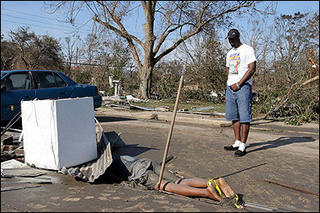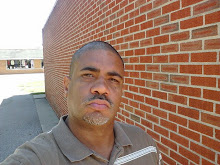Gay men, lesbians, and gender roles
Role of a lifetime:
Black gay men and women navigate gender roles in often contentious environments
By RYAN LEE Friday, September 09, 2005 http://www.washblade.com/2005/9-9/arts/feature/fem.cfm
Growing up in a small rural town in northeast Ohio, Jay Williams knew he couldn’t be a “faggot.”
He knew that he was attracted to other boys, but also realized that such feelings were widely rebuked by his family and neighbors, who, like many African Americans, viewed homosexuality as a sickness, sin or both.
“My family, we were raised that being gay was a no-no,” says Williams, a 22-year-old who moved to Decatur, Ga., five months ago. “It was based on religion — that, and the things my family had seen on TV, or the things they heard, or the things they knew about gay people.
“Their image of gays was just men running around, prancing around, being a lady,” he adds.
Heeding these warning signals from his cultural environment, Williams forged a masculine persona and asserted his manhood. He also developed a cadre of female friends who unwittingly provided a cover for Williams because his family assumed they were his girlfriends.
As Williams settled into being a black gay man, he says it was important for him to maintain his masculine identity.
And just as important as it is for him to “act like I have a dick between my legs,” Williams says it’s essential that his sexual partners are masculine as well.
“Feminine guys, I’ve got nothing against them, but as far as relationships, it’s just not for me because I would much rather just date a girl if I’m going to date a dude who acts just like a girl,” Williams says.
Black leaders like Nation of Islam leader Louis Farrakhan fuel the stereotypes about the role black men and women must hold in African-American communities. Faith-based leaders like Rev. Willie Wilson at Union Temple Baptist Church in Southeast D.C., also play a role.
In July, Wilson said in a sermon that lesbians were trying to “take over” the black family, and he made disparaging remarks about sexual acts among gay people.
Wilson, executive director of the 10th anniversary of the Million Man March, which Farrakhan convened, later apologized, though he reiterated his claims that “lesbianism” remains a serious threat to black teenage girls. The event next month is officially named the Millions More Movement.
Farrakhan recently invited the National Black Justice Coalition, a gay civil rights organization, to become one of about 100 co-conveners of the Millions More Movement rally, which is scheduled to take place on Oct. 15 in Washington, D.C.
Black gay rights advocates have expressed cautious optimism about Farrakhan’s invitation. They say he did not mention the words “gay” or “lesbian” in his invitation letter and did not agree to longstanding requests by black gay leaders that the Millions More Movement address the issue of homophobia and arrange for a gay man and a lesbian speaker to address the rally.
SINCE ARRIVING IN metro Atlanta in March, Williams admits that he feels more freedom to explore other sides of his sexuality, mainly because of the distance between himself and his family. But he says his “masculinity still stands on the same level as it did back home,” noting his reluctance to join a fraternity of black gay men in Atlanta who in his view maintain a masculine façade while evolving into “ladies,” or effeminate gay men.
“Folks pose all the time,” he continues. “But it’s things like ‘Girl,’ and ‘Sista’ — that right there, I don’t care how masculine you are, but if you call your boy your ‘sista,’ then being masculine isn’t who you really are.”
After first coming out as a lesbian following a seven-year marriage to a man, Ebonee Bradford found herself playing the masculine role in intimate relationships, an uncomfortable departure from the womanly ways she always incorporated into her identity.
Raised by a family of devout Baptists in Alabama, Bradford was steered away from her early tomboy tendencies into what was considered more gender-appropriate behavior, which Bradford continues to this day.
“I try to be 120 percent woman all the time,” says Bradford, 39. “Not because I have something against [masculine lesbians], but because I was brought up to be a lady, and that’s what I am.”
Appreciative of feminine beauty and attempting to avoid the masculinity that came with her seven-year marriage, Bradford says she was always attracted to other feminine lesbians, which forced her into the more aggressive role in her early relationships with women.
But Bradford struggled adjusting to the heightened levels of power and dominance she experienced while playing the masculine role in relationships, leading to disputes that resulted in domestic violence.
Now Bradford mostly avoids masculinity in herself and her partners, a choice she says limits her dating opportunities with other black lesbians.
“There’s not many occasions when you’ll see femme-femme or stud-stud couples,” she says. “It will almost always be opposite roles.”
Joel Gori, a filmmaker who created the touring dramatic dialogues “Keepin’ It Real: Sexual Orientation and Gender Roles in African-American Communities,” says being black means being subject to each other’s expectations.
“The African-American community is not as tolerant of the diversity in gender roles that exists within its own ranks,” Gori states in his introduction to his vignettes. “[The community] sets limits on the kinds of behaviors that are acceptably ‘black.’”
ONE OF THE most integral parts of black gender roles is how cultural images of what it means to be a black gay woman or man impact sexual negotiations and acceptance of sexual variance, he says.
“Is there a certain way to be a black man or a black woman? Gender role expectations affect how black gay men and women communicate with each other about sexuality,” Gori asserts. “Pressure exists to conform when blacks pair up.
“Homosexuality is part of the black community, but certain members don’t want to see it,” he continues. “Some people think you can’t be black and be gay. Black gays face these pressures every day.”
In clubs and in Internet chat rooms, and in most other venues in which black gay men, lesbians and transgendered people meet to socialize and date, gender roles are powerful — determinative enough to start or end relationships, and strong enough to marginalize entire segments of the black gay and lesbian population.
Bernard Bradshaw used to feel obligated to defy stereotypes as a 20-something black gay man, but he says his gender identity became “highly contextual.”
“There’s sometimes I’m definitely a little more butch, and there’s times when I’m with my best friend and we’re ki-ki-ing and having a good time,” says Bradshaw, who lives in Chicago and operates SexInThe2ndCity.com, a Web log about his sexual exploits.
But despite his fluidity when it comes to gender roles, Bradshaw says it’s difficult to admit that he’s part of the anti-femme problem among black gay men.
“When I hear guys on the chat line or on the Internet say ‘no fats, no femmes,’ there’s a part of that that disgusts me because I hate the way fem guys are dogged out,” Bradford says. “But the crazy thing is that what I and most people want is a masculine guy, and so sometimes I fear I’m sort of reinforcing the denigration of femme guys.”
Leslie Martin, a self-described “soft-stud” from Lithonia, Ga., says more black lesbians seem to embrace their femininity, the same way some black gay men are posing as masculine men, almost as if they were on the down-low.
“I think being femme is more in because I think a lot of people that don’t want it known, or don’t want to be out there like that as far as the workplace and stuff, I think it’s just like the DL thing,” Martin says.
But Maressa Pendermon of Atlanta says it seems as though a younger generation of lesbians are gravitating to a butch identity “because they believe it gives them the power in a relationships.”
A feminine lesbian, Pendermon says some have accused her of selling out, which makes her even more determined to openly assert and affirm her sexual orientation.
“I’ve gotten some angry reactions from people who may be more butch or masculine, and they see me as someone who can pass, so I may have more privilege than they have,” Pendermon says. “I feel a responsibility to be out because it’s not as easily detectable, and so I am out sort of to be in solidarity with other people.”
Many black lesbians religiously adhere to their preferred gender role, especially in the bedroom, according to Martin and Bradford.
“If they carry themselves like a stud, that’s basically what you’re going to get in the bedroom,” Bradford says.
But among black gay males, masculine façades often melt away at the bedroom door, according to Williams.
“It’s a different story from what they show the outside world almost every time,” Williams says.
www.washblade.com



